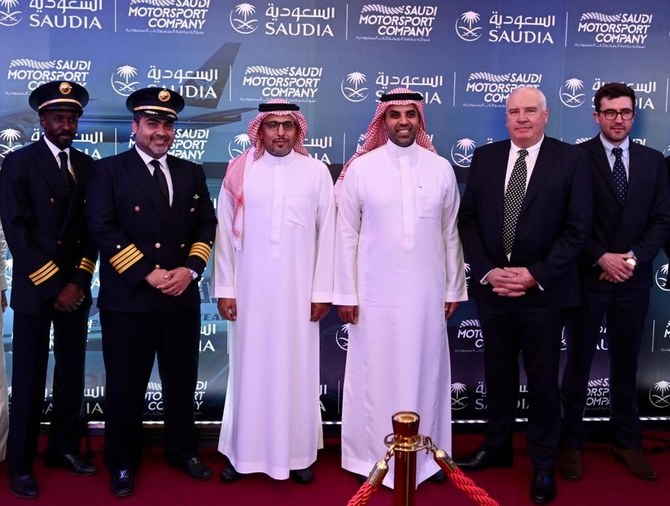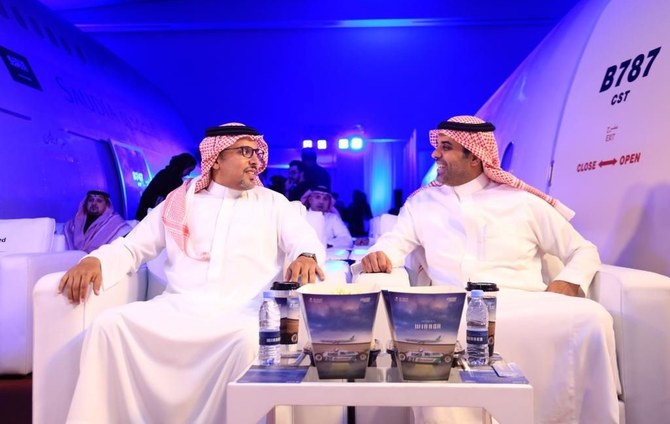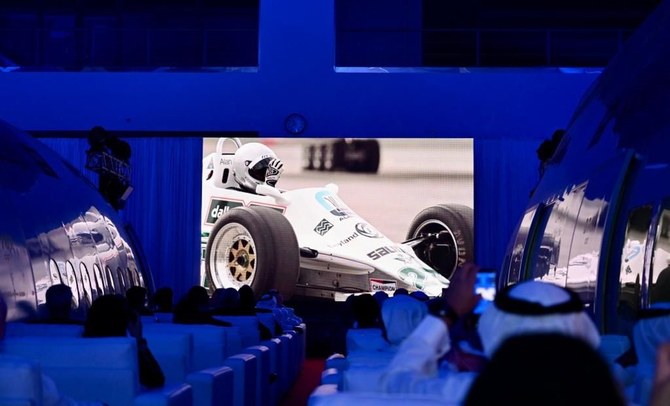JEDDAH: Saudi Arabia’s decades of involvement with Formula One motorsports has been brought to the big screen with the premiere of a documentary charting the restoration of a Saudi-sponsored car that scored famous victories in the 1980s.
The “Return of a Winner” documentary was screened at the Prince Sultan Aviation Academy in Jeddah earlier this week, in a collaboration between the Saudi Motorsports Company and Saudia airline.
The English documentary tells the story of the Williams FW07, a 40-year-old car sponsored by Saudia, and the race against time to restore it to celebrate its 1980 F1 World Championship-winning feats before last year’s Grand Prix in Jeddah.
Saudia’s investment drove the Williams team, then known as the Albilad Saudia Racing Team, with the Saudi logo printed on the car’s body in 1979, making the Kingdom the first Arab nation to get financially involved in Formula One.
The sponsorship lasted until 1984, giving international recognition and acknowledgement to Saudia in every race for eight F1 seasons. Williams achieved great success and incredible wins with the FW07, including the 1980 F1 World Championship result with 15 wins and 300 points to its name.
Post the Saudia-Williams era, the race car was settled into the archives of its owner for the next four decades, where it collected dust and rust.
However, the idea of bringing the forgotten legend back to life again was sparked when the owner realized the car’s significance to the Kingdom. He made the promise to bring the car from Riyadh to restore it and run it on the fastest street track possible, the Jeddah Corniche Circuit.
Restored to former glory
The restoration of the FW07 took intensive work by a brilliant British team of professional heritage race car specialists Chris Mellors and Ben Mellors and their team at Fifteen Eleven Design, who took on the challenge of having it ready for the Grand Prix in Jeddah in 2022.
Facing major challenges and technical difficulties Chris Mellors, the team principal of Fifteen Eleven Design, said in the documentary, “When we first looked at the car and tried to decide how we were going to do it, we were slightly concerned. (We had a) very tight timescale of about six weeks to get it ready for the Grand Prix, and some of the challenges were mountainous.”
Ben Mellors, Chris’s son and the head engineer of the company, said that the first time he saw the car it had an inch of sand and dust and he could not believe that a car in such a state won the 1980 championship. “It was quite clear that the task in front of us was going to be a large one,” he added.
With an empty shell engine, missing gearbox and parts, and serious mechanical concerns to deal with, the Fifteen Eleven Design team carefully packed the car and took it to their headquarters in the UK.
And so the magic began. Working around the clock on a mission that could not be rushed, the team restored the car while preserving its history, ensuring to use techniques and materials that were available in the 80s.
“It would have been very easy for us to start using modern materials to speed the process up, but you then start losing the essence of the 1980s F1 Grand Prix car,” Ben said.
Once the engine was restored, the FW07 went through a test to make sure it was powerful enough and had no technical issues. With 500 brake horsepower, 480 kg weight and iconic green skirts that suck the car to the ground improving aerodynamics, and a chassis with the logos on it printed again, the team effort was a success.
In an exclusive interview with Arab News, Ben Mellors said he took great satisfaction from restoring the car. But driving it for the first time was probably the best part of the whole journey.
Show time
To celebrate the successful restoration of the FW07, a race was held a few days before the Grand Prix in Jeddah between one of Saudia’s passenger planes and the FW07 at the King Abdulaziz International Airport.
The Sports Minister and former racer Prince Abdulaziz Bin Turki Al-Faisal was the man behind the idea of bringing the race car to reality again during the Grand Prix, where he had the chance to drive it.
He said: “It’s been a dream come true ... the amount of power and cheer, the energy you feel inside the car is amazing.”
Prince Khalid Bin Sultan Al-Abdullah Al-Faisal, chairman of the Saudi Automobile and Motorcycle Federation, told Arab News that the restoration gave the car a bright future.
“It’s a special moment for us … the support that Williams got from the Saudi companies gave him the opportunity to win his first championship. We played a big role in the past, and now we are very proud of our past,” he said.
“And we want to bring back all the memories together and showcase them to the world … we are going to make history again, like what we made with the Williams and Saudia car.”
Captain Ibrahim Koshy, the CEO of Saudia, told Arab News that “Return of a Winner” represents Saudia not only as an airline but also as a nation: “When they (the Williams team) partnered with Saudia, they say it was part of their success, and this was the golden age of Saudia.
“And I think this is really what we are going back to. We have a young generation, and we are engaging to get the world to visit Saudi Arabia. The sporting events … connecting the world to Saudi Arabia, via the airports and our network is growing.
“This really represents something more than just the event itself. Rather than just the restoration, it is more of a vision.”
Khaled Tash, group chief marketing officer of Saudia told Arab News that the documentary tells the Saudi story to the world.
“Saudia, as an airline has been for the greater part of its history, an airline that takes Saudis to the world to study, to go on vacation, or for business, but now the agenda and opportunities are different.
“We now have a country that is full of opportunities for tourism, entertainment and business, and we want to bring people to Saudi Arabia.”
The Jeddah Corniche Circuit is undergoing preparations to host the 2023 Saudi Arabian Grand Prix, the third international racing event hosted by the coastal city, which will be held on March 17-19 amid global anticipation for one of the biggest racing events of the year.
The documentary has been added to Saudia’s in-flight entertainment, giving passengers the chance to enjoy the 35-minute film by Patrick Head, Frank Dernie and Neil Oatley.



















